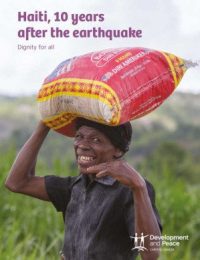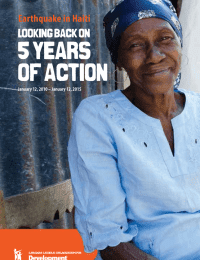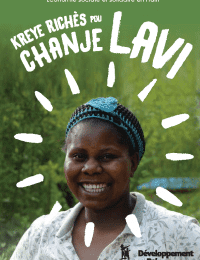Haiti is one of the poorest countries in the world. More than half of its population live in extreme poverty and have considerable humanitarian needs.
In a male-dominated society, women are particularly vulnerable. Already impacted by gender-based violence, including femicide, women suffer discrimination and have reduced access to economic opportunities.
Although Haiti has one of the lowest carbon footprints in the world, it is one of the top three countries most vulnerable to the impacts of climate change, including soil erosion and intense meteorological phenomena such as hurricanes and floods. The country is also situated on important seismological fault lines.
At the political level, the parliament’s mandate has expired, and the government is dysfunctional. The power vacuum has allowed criminal gangs to proliferate and carry out kidnappings for ransom with impunity. State institutions have almost stopped functioning.
In August 2021, another major earthquake of 7.2 on the Richter scale struck Haiti. This time, the earthquake hit the country’s southern peninsula. Contrary to the 2010 earthquake, which destroyed Port-au-Prince, the latest earthquake hit rural areas and had a lower death toll at around 2,500 (compared to 280,000 in 2010). However, more than 80,000 families lost their homes and schools, roads were damaged, and many farmers lost their harvests.
Today, criminal gangs control large parts of the country and block roads leading in and out of the capital. Fuel shortages have caused rampant inflation and food shortages. Many Haitians face food insecurity, and some face possible famine. Following the imposition of sanctions in November 2022, Development and Peace called on the Government of Canada to do more and to listen to the people in order to find lasting solutions.








Development and Peace has been involved in Haiti since the 1970s and has in-depth knowledge of the local organizations. Our long-standing presence allows us to work for social change by empowering Haitians and responding more effectively to climate-related disasters.
Our work is highly respected by Haitians and by other non-governmental organizations, and we are able to achieve significant results. We have been helping communities transition from being the recipients of humanitarian aid to being active participants in long-term community development projects, and we have strengthened local grassroots organizations so that they can be at the forefront of aid programs in response to emergencies. For example, in the wake of 2016’s Hurricane Matthew, we helped local grassroots organizations build 25 houses in Cavaillon, a heavily affected town. We were later heartened to learn that those houses had withstood the force of the 2021 earthquake.
Our approach reinforces the dignity of Haitians and puts them at the forefront of their own development. We support local organizations that are working to effect positive change in their communities, and we support their advocacy efforts with their governments.
We work with women’s groups to empower them, to ensure that they are more respected in society and to address impunity for rape. This groups offer medical, legal and psycho-social assistance to the victims of gender-based violence. This work includes a broad program to raise awareness about the situation of women, with a focus on preventing and reducing violence; it also engages with groups of men, including musicians, and taxi and truck drivers, offering them role models for positive masculinity.
We are currently supporting a post-earthquake program in the Southern department that aims to rebuild 40 houses for families who lost their homes in Cavaillon. The same program is also helping farmers grow food to eat and to sell on local markets, with access to credit.
We also promotes agro-ecological approaches that slow erosion produced by climate change. We are working with women farmers to strengthen their resilience and autonomy by offering them access to poultry and egg production and helping them to grow fruit and vegetables and to form and participate in cooperatives. Our approach is one of food sovereignty: to increase local food production and decrease dependence on food imports.
We are looking forward to increased political stability in Haiti, with a functional government that will allow our partners to work more efficiently to increase local agricultural production, feed rural communities and create income for small farmers. Such initiatives will reduce dependency on food imports. Increased political stability will allow some of our partners to develop initiatives in ecological tourism. We plan to continue to work with the communities benefiting from our post-earthquake programs. This work will involve long-term development initiatives that strengthen their resilience and reduce their vulnerability to future climate-related catastrophes.


On January 12, 2010, one of the worst natural disasters hit Haiti. A deadly earthquake struck the island, killing thousands of Haitians, leaving torn-down homes, collapsed buildings and uprooted trees in its wake. Beyond the destruction and injuries, the psychosocial impacts, too, were significant. In response to this exceptional situation, Development and Peace — Caritas Canada, which had been working with the most vulnerable communities in the country since 1972, expanded its scope to support survivors.


The report Looking back on 5 years of action presents a summary of the reconstruction program put in place by Development and Peace in Haiti following the violent earthquake that hit the country on January 12th, 2010. It presents the humanitarian aid, human rights, reconstruction and food security activities that were carried out in collaboration with our local partners.


The final part of Development and Peace’s reconstruction program in Haiti consists of putting in place a social solidarity economy program. This $3 million program is aimed at supporting the development of a dozen social enterprises involved in agriculture, poultry farming, textile production and handicrafts. The profits from these businesses will help fund the social programs offered by the organizations that launched them and help guarantee their financial autonomy.
About us
Our work
Get involved
Ways to give
Resources
Get in touch
555 René-Lévesque Blvd. West, 8th Floor
Montreal (Quebec) Canada H2Z 1B1
Phone: 514-257-8711
Toll-free: 1-888-234-8533
Fax: 514-257-8497
Email: info@devp.org
Charity number: 1 1882 9902 RR 0001


Our international cooperation program is carried out in part with the financial support of the Government of Canada acting through Global Affairs Canada.
Development and Peace — Caritas Canada is the official international solidarity organization of the Catholic Church in Canada and the Canadian member of Caritas Internationalis.
Copyrights © 2024
Don’t miss anything about the work of our international partners or our awareness and mobilization campaigns.
Sign up now for our newsletter.